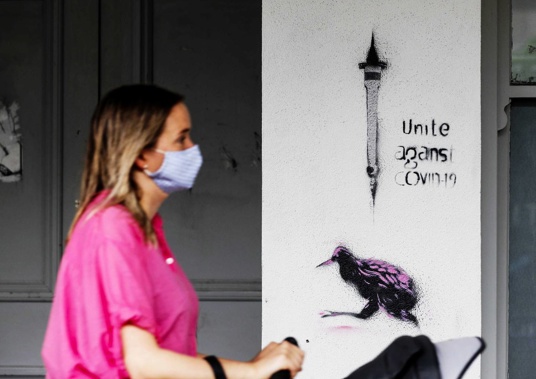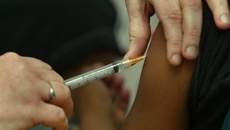
There are 7068 new community cases of Covid-19 in New Zealand today, and 18 people have died.
There are 398 people in hospital, eight of whom are in intensive care.
The seven-day rolling average of new Covid cases is 7595. A week ago it was 7512.
Of the 18 new deaths reported today, 10 died over the past two days and eight people had died since April 28, the Ministry of Health said.
"These deaths take the total number of publicly reported deaths with Covid-19 to 958 and the seven-day rolling average of reported deaths is 15."
Earlier today
All eyes will again be on Omicron cases in Auckland this afternoon, as our biggest city turns bellwether for Covid-19 rates in New Zealand.
Kiwis also learned today their leader has tested positive for Covid-19, with Jacinda Ardern posting a photo of her positive rapid antigen test result on Instagram.
The Prime Minister's been isolating at home since her fiance, Clarke Gayford, tested positive on Sunday. Their 3-year-old daughter, Neve, tested positive on Wednesday.
Across the country, there were 7441 new community cases of Covid-19 in New Zealand yesterday, with the latest numbers to be released at 1pm.
The most up-to-date seven-day rolling average of community cases nationally is 7548, just below that of a week earlier, when it was 7555.
But experts are keeping a watch on rising infection rates in Auckland - where cases have jumped by 50 per cent in a few weeks, which may signal the start of a national climb to a new Covid-19 normal.
Daily cases peaked in early March at 13,252 before the combined seven-day rolling average across Auckland's three district health boards fell below 1600 a month ago.
But at the start of this week the daily average was close to 2500, and it could top 3000 in coming weeks as the virus continued working its way through communities, Covid-19 modeller Professor Michael Plank told the Herald.
"Auckland and Waitematā seem to have a stronger rebound in cases than Counties-Manukau, which we know had a very high infection rate earlier in the year, so there's likely a bit more immunity built up in that part of the population."
The city has previously been identified as the place to watch, with its outbreak weeks ahead of the rest of the country after Omicron was first detected in the community in January.
"Auckland's the place to look [first] really - the equilibrium's starting to shift towards case numbers rising", epidemiologist Professor Michael Baker said late last month, as infection rates began trending up.
Plank yesterday reminded people to be vigilant in trying to avoid the virus, especially given infections so far hadn't been as heavily concentrated in older age groups, who are more likely to suffer serious illness.
"There's still a large susceptible population left – particularly in older groups – and what we're seeing now is the virus finding its way into new pockets that it hasn't really been in before."
While more than 95 per cent of over 12s had have two vaccinations against Covid-19, only 70 per cent of those eligible have received their booster, which much reduces the chance of infection and serious illness against the highly-infectious Omicron subvariants.
Vaccination rates for children, meanwhile, remain woeful, with just 24.6 per cent of 5 to 11-year-olds double-dosed, a figure which plummets to 11.6 per cent and 13.8 per cent for tamariki Māori and Pasifika children.
Few children have died with Covid-19 in New Zealand - according to Ministry of Health figures three under 10s and four aged between 10 and 19 have died - but there are fears some of the almost 300,000 under 20s infected with the virus could be left with long term health impacts.
Vaccination reduced the risk of kids acquiring long Covid by at least half, epidemiologist Baker said.
"Death as an acute outcome is awful but it's very rare in children. The bigger problem will be, are some children going to get debilitating long-term chronic effects from Covid-19? I think the evidence is yes."
Rising case numbers come after restrictions were eased just before Easter, temperatures began to cool and kids returned to schools, where masks are no longer required to be worn - although some schools chose to stick with mask mandates.
Nearly 8000 cases have been reported in schools in the seven days to yesterday.
More than 150 doctors and scientists have already collectively urged the Government to reinstate a classroom mask mandate, to no avail.
The increase in infection across the population was likely to be "gradual", unlike the first Omicron wave, where case numbers doubled every few days, Plank said.
Hospitalisation rates remain steady at around 72 cases per million of population, but would likely rise if infections increased in older age groups.
There were 398 people in hospital with Covid-19 yesterday, six in intensive care or high dependency units.
Twenty-nine new deaths were also reported, including of two people aged in their 20s and three aged in their 30s.
Fourteen of the deaths occurred in the previous two days and 15 between March 24 and May 7.
Since the pandemic began 940 people have died with Covid-19 in New Zealand, and just over a million have been infected, although one expert - University of Auckland Senior Lecturer Dr David Welch - said the real number of infections could be more than double official figures.
Take your Radio, Podcasts and Music with you









